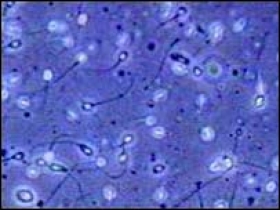
Numbers of egg and sperm donors have been falling in recent years
A 15-year-old boy has tracked down his anonymous sperm donor father using a swab test and the internet.
He sent off his own cheek swab to an online genealogy DNA-testing service.
This case has serious implications for men who have donated sperm in the past with promises of anonymity, says New Scientist Magazine.
Since April 2005, information which can identify the donor of an egg, sperm or embryo, can be given to child born in the UK as a result when they are 18.
Serious implications
An estimated 25,000 people have been born from donated sperm in the UK in the past 15 years.
The boy in the New Scientist report tracked down his father from his Y chromosome, which is passed down from father to son.
His genetic father had never supplied his DNA to the website that they boy sent the swab to - FamilyTreeDNA.com - but two other men who were on the database had Y chromosomes that bore a close match to the boy's.
Both men had the same surname, although with different spellings.
The two did not know each other, but the similarity between their Y chromosomes suggested there was a 50% chance that all three had the same father, grandfather or great-grandfather.
Though the 15-year-old boy's donor had been anonymous, his mother had been told the man's date and place of birth and his college degree.
The boy fed this information into another online service, Omnitrace.com, to find out the names of everyone that had been born in the same place on the same day.
Only one man had the same name that he was looking for, and within 10 days he had made contact with this man.
Bryan Sykes, a geneticist at Oxford University and chairman of the family tree tracing service OxfordAncestors.com, said the case raised serious questions about whether past promises of anonymity could be honoured.
A spokeswoman from the Donor Conception Network, a group started by parents who had decided to tell their children about their origins and who came together to support each other, agreed.
She said it could be distressing for a donor who had thought and reassured that they were giving anonymously and would not be traced in the future.
Counselling
Lindsey Marshall of UK DonorLink, said the scenario raised big ethical issues.
The UK DonorLink register is specifically for anyone over the age of 18 who was conceived using donated sperm or eggs, or who donated, in the UK, before the Human Fertilisation and Embryology Act came into force in August 1991.
Both parties - the person conceived using donor sperm or eggs and the donor - has to give consent and is offered counselling, support and advice throughout the process, which Ms Marshall said was crucial.
"It raises all sorts of ethical issues. We would not accept anyone on our register that has not given permission.
"We talk at length with people going on our register about the potential implications for all parties involved."
For example, the anonymous donor may have a family of their own and those members may not know that their loved one had been a donor, she said.
"The ramifications are huge. People's lives can be turned upside down."
She also stressed that it was important for people to realise that even the most sophisticated DNA tests would not prove any match with 100% accuracy.
"The ramifications are huge. People's lives can be turned upside down" - Lindsey Marshall of UK DonorLink
Source: bbc.co.uk






